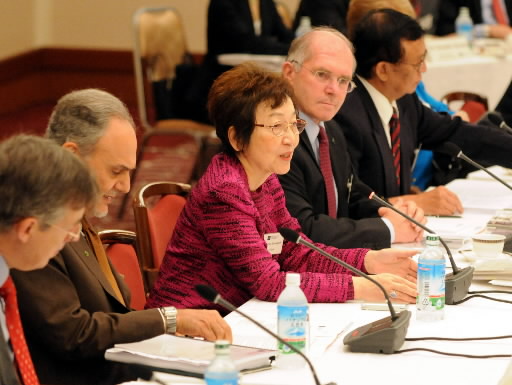Nuclear Weapons Can Be Eliminated: Chapter 12, Part 2
Jun. 19, 2010
Chapter 12: Opening the Door to Abolition
Part 2: Leaving the nuclear umbrella
by the "Nuclear Weapons Can Be Eliminated" Reporting Team
Nuclear deterrence is often used to justify nuclear weapons. This is seen in such reasoning which cites the avoidance of nuclear war during the Cold War and contends that the possession of nuclear arms wards off others' attacks. This past May, however, a report which questioned this line of thinking on the part of the nuclear weapon states was issued.
The 84-page report is titled "Delegitimizing Nuclear Weapons: Examining the Validity of Nuclear Deterrence" and it was produced by The James Martin Center for Nonproliferation Studies (CNS) at the Monterey Institute of International Studies. The research was sponsored by the Swiss government and the report was released to coincide with the 2010 Nuclear Non-proliferation Treaty (NPT) Review Conference.
Relying on the myth of nuclear deterrence
Patricia Lewis, 53, the deputy director at CNS, said that nuclear deterrence, without an examination of its validity, has been overvalued. Considering the number of wars that have occurred over the past 65 years, she says, the idea that nuclear weapons prevent war is not borne out.
This view is not new. Still, many governments cannot pull away from the spell of nuclear deterrence.
Does the overwhelming nuclear arsenal of the United States prevent North Korea from attacking its neighbors? Do India and Pakistan, both of which are non-signatories to the NPT and possess nuclear weapons, put off using their nuclear arms against one another because the number of weapons in their nuclear arsenals is roughly the same?
Japan, the A-bombed nation, believes in the myth of nuclear deterrence and remains dependent on the U.S. nuclear umbrella for its security. The Obama administration, which has advocated the abolition of nuclear weapons, stated in the Nuclear Posture Review (NPR), issued this past April: "This agenda encompasses a comprehensive set of concrete steps to reduce nuclear dangers to the United States and our allies and partners, to reduce the role and numbers of U.S. nuclear weapons, and at the same time to ensure that nuclear deterrence remains effective for the problems for which it is relevant in today's world." The posture of U.S. allies, including Japan, surely had an impact on the wording of the NPR with regard to nuclear deterrence.
Takao Takahara, a professor at Meiji Gakuin University and an expert on international politics, contends that the nuclear umbrella has no substance, that this policy is a kind of deception. Kazuhisa Ogawa, a military analyst, said that North Korea does not pose a significant threat to Japan, a comment made in discussing the military capability of North Korea, which has conducted nuclear tests. He also believes a clamor should not be made about the Chinese threat, as that nation continues to expand its military capability.
Taking the lead in nuclear abolition efforts
The A-bombed nation of Japan should abandon its policy of seeking security via the nuclear umbrella. Japan could then earn greater trust from other countries through such international leadership. This would also benefit the conditions of Japan's coexistence with its neighbors in Asia.
The International Commission on Nuclear Non-proliferation and Disarmament (ICNND), a joint initiative by the Japanese and Australian governments, issued its final report last December. In the report, the ICNND called on every nuclear weapon state to adopt a "no-first-use" declaration and "negative security assurance," forming a pledge not to attack non-nuclear states, based on the recognition that reducing the role of nuclear weapons is a step toward their abolition.
The purpose of nuclear weapons should therefore be limited to deterring the use of such weapons. Under these conditions, non-nuclear weapon states would not need to turn to a nuclear umbrella for security.
Japan should sway the nuclear powers to observe these two policies while getting out from under the shadow of the nuclear umbrella itself. Such steps would help prompt a breakthrough with regard to the myth of nuclear deterrence.
(Originally published on June 15, 2010)
To comment on this article, please click the link below. Comments will be moderated and posted in a timely fashion. Comments may also appear in the Chugoku Shimbun newspaper.








